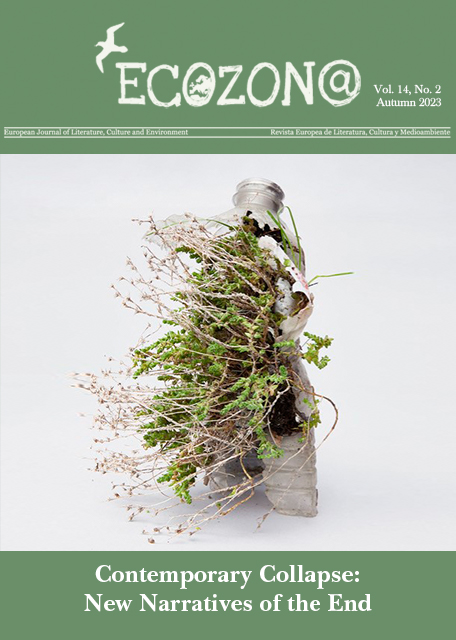The Screaming Forest: An Ecocritical Assessment of Le Cri de la forêt
DOI:
https://doi.org/10.37536/ECOZONA.2019.10.2.2962Keywords:
postcolonial ecocriticism, deforestation, Henri Djombo, Osée Colin Koagne, Francophone AfricaAbstract
From a postcolonial ecocritical standpoint, this essay analyzes the play Le Cri de la forêt (2015) co-authored by Henri Djombo, a cabinet minister from Congo-Brazzaville, and Osée Colin Koagne, a stage director and environmental activist from Francophone Cameroon. Mindful of the rich biodiversity of the Congo Basin where the playwrights originate, the essay interrogates why the forest in the play is screaming and moves on to engage with related ecological questions such as the scapegoating of witchcraft and doubtful traditional beliefs amidst climate change. It examines the controversial ways in which the play simultaneously promotes indigenous knowledge systems and capitalism. Furthermore, the essay grapples with the oft-debated role of overpopulation on climate change and ecological degradation, particularly in regions of the global South such as Africa. And, finally, it explores the playwrights’ depiction of women and children as both victims and combatants of environmental collapse, stressing their important role in fighting climate change as opposed to some critics’ claims that they are merely helpless victims. The essay therefore constitutes a double intervention in ecocriticism in the Francophone African world: both the playwrights and the present author seek to intervene in ecological discourses and actions.
Resumen
Desde un punto de vista ecológico y poscolonial, este ensayo analiza la obra Le Cri de la forêt (2015) en co-escrito por Henri Djombo, ministro de gabinete de Congo-Brazzaville, y Osée Colin Koagne, director de escena y activista ambiental de Camerún Francófono. Consciente de la rica biodiversidad de la Cuenca del Congo, de donde se vienen los dramaturgos, el ensayo cuestiona por qué el bosque en la obra grita y se involucra en cuestiones ecológicas relacionadas, como el chivo expiatorio de la brujería y las creencias tradicionales dudosas en torno al tema del cambio climático. Examina las formas controvertidas en que la obra promueve simultáneamente los sistemas de conocimiento indígenas y el capitalismo. Además, el ensayo aborda el papel tan debatido de la superpoblación sobre el cambio climático y la degradación ecológica, en particular en regiones del Sur global como África. Y, finalmente, indaga la representación de los dramaturgos de mujeres y niños como a la vez víctimas y combatientes del colapso ambiental, destacando su papel importante en la lucha contra el cambio climático en contravención de las afirmaciones de algunos críticos de que son simplemente víctimas indefensas. Por lo tanto, el ensayo constituye una doble intervención en el ámbito de la eco-crítica en el espacio francófono africano: tanto los dramaturgos como el autor actual buscan intervenir en los discursos y acciones ecológicas.
Downloads
Downloads
Published
Issue
Section
License
Authors who publish with this journal agree to the following terms:
a) Authors retain copyright and grant the journal right of first publication with the work simultaneously licensed under a Creative Commons Attribution License that allows others to share the work with an acknowledgement of the work's authorship and initial publication in this journal (CC BY-NC for articles and CC BY-NC-ND for creative work, unless author requests otherwise.
b) Authors are able to enter into separate, additional contractual arrangements for the non-exclusive distribution of the journal's published version of the work (e.g., post it to an institutional repository or publish it in a book), with an acknowledgement of its initial publication in this journal.
c) Authors are permitted and encouraged to post their work online (e.g., in institutional repositories or on their website) prior to and during the submission process, as it can lead to productive exchanges, as well as earlier and greater citation of published work (See The Effect of Open Access).










